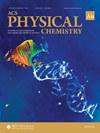将超快核磁共振作为检测溶液中快速化学变化的工具
IF 3.7
Q2 CHEMISTRY, PHYSICAL
ACS Physical Chemistry Au
Pub Date : 2024-07-24
DOI:10.1021/acsphyschemau.4c0004210.1021/acsphyschemau.4c00042
引用次数: 0
摘要
超快核磁共振(NMR)使用空间编码,只需一次扫描即可记录整个二维数据集。这种方法可应用于傅立叶变换或拉普拉斯变换 NMR。在这两种情况下,采集时间都大大短于传统的二维/拉普拉斯 NMR 实验,因此可用于监测快速化学变化。本视角概述了超快 NMR 的原理,并重点举例说明了如何使用超快 NMR 以高时间分辨率现场检测快速分子转化。我们将讨论未来如何将这一宝贵工具用于研究更广泛的新型反应性。本文章由计算机程序翻译,如有差异,请以英文原文为准。
Ultrafast Nuclear Magnetic Resonance as a Tool to Detect Rapid Chemical Change in Solution
Ultrafast nuclear magnetic resonance (NMR) uses spatial encoding to record an entire two-dimensional data set in just a single scan. The approach can be applied to either Fourier-transform or Laplace-transform NMR. In both cases, acquisition times are significantly shorter than traditional 2D/Laplace NMR experiments, which allows them to be used to monitor rapid chemical transformations. This Perspective outlines the principles of ultrafast NMR and focuses on examples of its use to detect fast molecular conversions in situ with high temporal resolution. We discuss how this valuable tool can be applied in the future to study a much wider variety of novel reactivity.
求助全文
通过发布文献求助,成功后即可免费获取论文全文。
去求助
来源期刊
CiteScore
3.70
自引率
0.00%
发文量
0
期刊介绍:
ACS Physical Chemistry Au is an open access journal which publishes original fundamental and applied research on all aspects of physical chemistry. The journal publishes new and original experimental computational and theoretical research of interest to physical chemists biophysical chemists chemical physicists physicists material scientists and engineers. An essential criterion for acceptance is that the manuscript provides new physical insight or develops new tools and methods of general interest. Some major topical areas include:Molecules Clusters and Aerosols; Biophysics Biomaterials Liquids and Soft Matter; Energy Materials and Catalysis

 求助内容:
求助内容: 应助结果提醒方式:
应助结果提醒方式:


